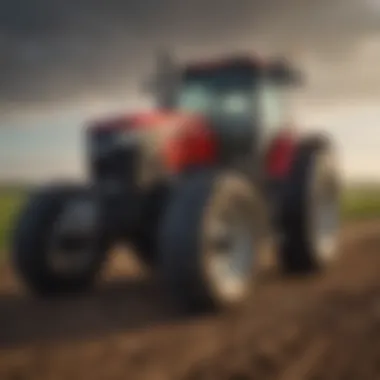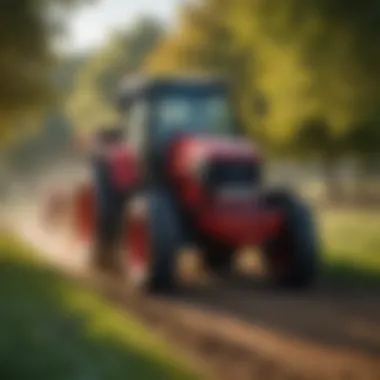Stevens Tractor: Key Insights and Innovations


Intro
This article will thoroughly investigate the world of Stevens Tractor, a significant presence in agricultural machinery. Understanding its historical context, current features, and performance in the field provides essential insights for farmers looking to enhance productivity. This exploration will also delve into the role of Stevens Tractors in modern agricultural practices. By reviewing innovations and sustainability initiatives, readers can gain a rounded perspective on how these tractors support today’s farming challenges.
Overview of the Topic
Definition and Importance
The Stevens Tractor brand stands out in the agricultural machinery sector. Its tractors are designed to meet the diverse needs of modern farmers. As the demand for efficient farming increases, understanding the significance of such equipment becomes vital. Tractors are not just machines; they are tools that enable farmers to optimize their operations, improving both yield and sustainability.
Current Trends
Recent trends in the agricultural sector emphasize sustainability and innovation. Farmers are increasingly leaning toward machinery that minimizes environmental impact while maximizing efficiency. Stevens Tractor embraces these trends by integrating advanced technology into their products. Features like fuel efficiency, precision farming tools, and eco-friendly materials are now standard expectations for new tractors.
Key Techniques and Practices
Step-by-Step Guide
When acquiring and utilizing Stevens Tractors, farmers should follow a systematic approach:
- Assess Needs: Evaluate the specific farming requirements based on the type of crops and the size of the land.
- Research Models: Explore different models of Stevens Tractors to find the best fit.
- Consider Attachments: Determine any additional tools or attachments needed for specific tasks.
- Regular Maintenance: Implement a routine maintenance schedule to ensure longevity and optimal performance.
- Training: Train all operators to efficiently use the machinery and understand safety protocols.
Tools and Equipment Needed
To gain the most out of Stevens Tractors, the following tools are essential:
- GPS systems for precision farming.
- Various attachments like plows, harrows, and seeders.
- Maintenance tools for routine checks.
- Safety gear for operators.
Challenges and Solutions
Common Obstacles
While Stevens Tractors are high-quality machines, various challenges can arise:
- High Initial Investment: The cost of purchasing new equipment can be a barrier for some farmers.
- Technological Complexity: Some advanced features may require a learning curve.
- Maintenance Needs: Regular maintenance can be time-consuming yet essential.
Innovative Solutions
Addressing these challenges effectively requires smart strategies:
- Financing Options: Many dealers offer financing plans to ease the burden of upfront costs.
- Training Programs: Stevens Tractor often provides training resources for users to get acquainted with advanced features.
- Customer Support: Reliable customer service can help with maintenance issues, ensuring machines are always operating optimally.
"Investing in quality agricultural machinery is as much about productivity as it is about sustainability and long-term efficiency."
The End
In summation, Stevens Tractor plays a crucial role in the agricultural machinery landscape. By exploring its features, current trends, and the potential challenges farmers might face, this article aims to provide valuable insights. Equipped with this knowledge, farmers can make informed decisions that enhance their operational efficiency and productivity.
Preamble to Stevens Tractor
Understanding the intricacies of Stevens Tractor is crucial for anyone involved in agriculture or farming. This section sets the stage for readers to appreciate the unique contributions of Stevens Tractors to the agricultural landscape. As agricultural practices evolve, the importance of reliable machinery becomes evident. Stevens Tractor not only represents a tool for farming but also embodies advancements in technology and sustainability in agriculture.
Background and Origins
Stevens Tractor traces its roots back to early innovations in agricultural technology. Established in the mid-20th century, the company emerged in response to the growing demands of post-war agriculture. During this period, farmers sought machinery that could enhance productivity and efficiency. Over the years, Stevens has continually adapted and expanded its product line, responding to changes in agricultural practices and farmer needs. The brand's commitment to quality and performance has allowed it to maintain a reputable position in the industry.
Significance in Agriculture
The role of Stevens Tractor in modern agriculture is multifaceted. These tractors not only serve traditional farming purposes but also integrate modern technologies that improve efficiency. The significance surfaces in the way Stevens demonstrates responsiveness to farmer challenges. These challenges include labor shortages and the need for higher yields. Additionally, Stevens Tractors are designed with precise engineering, allowing them to perform various functions like plowing, tilling, and planting effectively. Moreover, the company's focus on innovation contributes to its standing as a reliable choice for farmers looking to invest in long-term solutions for their agricultural needs.
"The history of Stevens Tractor is not just about machines; it's about addressing the evolving challenges of farming through innovation and technology."
Through examining the background and significance of Stevens Tractor, readers gain insight into how the company successfully navigates the complexities of the agricultural sector. This groundwork is essential for understanding the subsequent sections, which will delve into the various types of tractors offered, key features, and their impact on farming efficiency.


Types of Stevens Tractors
The type of tractor an agricultural professional chooses is important in influencing productivity. Stevens Tractor offers a range of models to cater to varied farming needs. Understanding the different types of Stevens Tractors can help farmers make informed choices. These tractors are designed with specific uses in mind, thus addressing diverse operational tasks in agriculture. The three primary categories include compact tractors, utility tractors, and heavy-duty tractors.
Compact Tractors
Compact tractors from Stevens are ideal for small to medium-sized farms. They are popular for their versatility and ease of use. These machines are often lighter, allowing for more maneuverability in tighter spaces. Compact tractors can be equipped with a variety of attachments. Examples include loaders, mowers, and tillers. This adaptability makes them particularly useful for landscaping and other light-duty applications.
A key advantage of compact tractors is their efficiency. Farmers can manage smaller tasks economically without the need for larger machines. These tractors also have lower operating costs. They consume less fuel and require less maintenance compared to heavier models. For small-scale farmers or those with diverse farming needs, compact tractors are a dependable option.
Utility Tractors
Stevens’ utility tractors serve as a middle ground between compact and heavy-duty options. Designed for a range of applications, these tractors are robust enough to handle tougher jobs while remaining user-friendly. Their power and size allow them to perform tasks that might be challenging for compact tractors. Farmers often use them for tasks like plowing, lifting, and hauling.
These tractors come with diverse horsepower options, making them suitable for different farming operations. The transmission and hydraulic systems in utility tractors are designed for optimal performance. This means they can tackle heavy loads and work on uneven terrain without difficulties. Utility tractors support various attachments, enhancing their utility on any farm.
Heavy Duty Tractors
Heavy-duty tractors offered by Stevens are designed for full-scale agricultural operations. They are built to handle demanding tasks, such as large-scale plowing and fieldwork. The powerful engines in these tractors provide high horsepower, ensuring reliable performance in intensive applications.
Heavy-duty tractors typically feature advanced technology and superior build quality. Farmers appreciate their durability, as they can withstand harsh conditions and heavy usage. Maintenance is a crucial aspect for these machines; proper care can extend their lifespan significantly. Use of heavy-duty tractors is often justified by the substantial operational outcomes they offer.
Key Features of Stevens Tractors
The Key Features of Stevens Tractors are crucial in understanding their significance in the agricultural sector. These characteristics not only enhance the tractors' performance but also influence their usability in diverse farming scenarios. Potential buyers and operators should comprehend these aspects thoroughly because they can determine operational success. Key features connect to operational efficiency, user experience, and overall productivity on the farm.
Engine Specifications
Stevens Tractors are known for their robust engine specifications, which play a vital role in their function. The engines often operate on diesel and ensure sufficient power to handle various tasks, from plowing to hauling. For instance, many models include turbocharged engines that offer more torque and horsepower. These specifications are essential as they directly affect the machine's efficiency and reliability. Particularly, farmers benefit from engines that provide a balance between power and fuel consumption.
A well-regarded engine specification of Stevens Tractors allows them to perform effectively in different terrains and weather conditions. The focus on durability is also critical in design to reduce maintenance requirements over time.
Transmission Systems
The transmission systems of Stevens Tractors showcase innovation and adaptability. These systems allow operators to switch between different speed ranges smoothly, making it easier to manage various tasks. Generally, the tractors come with options for both manual and hydrostatic transmissions. Each type has its benefits:
- Manual transmission gives the operator more direct control over power delivery.
- Hydrostatic transmission is known for its ease of use and provides seamless acceleration.
The choice of transmission affects how farmers approach their work. It can improve their efficiency during field operations. A system that reduces the operator's workload and advance multitasking abilities is significant in today’s fast-paced agricultural environment. Moreover, the maintenance of these systems is less complicated due to the engineering precision that goes into their design.
Hydraulic Systems
Hydraulic functionality in Stevens Tractors significantly contributes to their versatility and efficiency. These systems control attachments such as loaders and tillers, making tasks easier and more effective. The hydraulic systems are often designed to provide responsive control and high lifting capacities. Efficient hydraulic systems can lift heavy loads, which improves overall productivity in farming operations.
Most models include features that optimize the hydraulic flow, enhancing responsiveness while reducing pressure loss. This capability leads to smoother operation during intense farm duties.
In summary, understanding the engine specifications, transmission systems, and hydraulic systems of Stevens Tractors is paramount. These aspects are not just specifications; they redefine operational capabilities on modern farms. By focusing on these key features, buyers can ensure they select the right tractor to fit their needs and maximize efficiency in their agricultural endeavors.
Performance Analysis
Performance analysis plays a vital role in understanding the capabilities and effectiveness of Stevens Tractors in agricultural settings. By evaluating various performance metrics, users can assess how these tractors contribute to operational productivity and long-term durability. This section elaborates on three main aspects of performance: operational efficiency, durability and maintenance, and fuel consumption metrics. Given the critical role of machinery in modern farming, analyzing these elements can help farmers make educated decisions regarding equipment investments.
Operational Efficiency
Operational efficiency refers to the ability of Stevens Tractors to maximize output while minimizing input. This metric is crucial in agriculture, where time and resources are often limited. Stevens Tractors are designed to carry out tasks such as plowing, tilling, and planting quickly and effectively. The use of advanced engineering in their design ensures that each model can perform optimally under various conditions.
Several features contribute to this operational efficiency:
- Power-to-Weight Ratio: A higher power-to-weight ratio means that a tractor can perform more work without being overloaded.
- Implement Versatility: Stevens Tractors can be used with a wide range of attachments and implements, allowing them to adapt to multiple farming tasks.
- Ease of Use: User-friendly controls and intuitive design enhance efficiency by reducing the learning curve for operators.
Evaluating how these factors interact can provide insights into how effectively farmers can utilize Stevens Tractors in their operations.
Durability and Maintenance


Durability is another critical aspect of performance. Farmers require machinery that can withstand the rigors of agricultural work. Stevens Tractors are constructed using high-quality materials and undergo rigorous testing to ensure longevity and reliability.
Regular maintenance is essential to prolong the life of any tractor. Stevens provides manuals and guidelines for routine checks that include:
- Fluid Levels: Regularly checking engine oil, coolant, and hydraulic fluid levels.
- Tire Condition: Inspecting tire pressure and tread wear can prevent premature replacement.
- Overall Inspection: Making sure all components are functioning properly.
By focusing on durability and establishing a consistent maintenance schedule, users can ensure their Stevens Tractors will remain in top condition for many years.
Fuel Consumption Metrics
Fuel consumption metrics are important for operating cost analysis. With the rising prices of fuel, it is imperative for farmers to consider the efficiency of a tractor's engine. Stevens Tractors are designed to optimize fuel use without compromising on power.
Several factors affect fuel consumption:
- Engine Size: Larger engines may require more fuel, while smaller engines can be more efficient, depending on the tasks performed.
- Load Management: Using the tractor within its optimal load range can improve efficiency and reduce fuel usage.
- Soil and Terrain Conditions: Different soil conditions may require different approaches to fuel consumption.
Tracking these metrics can give farmers a better understanding of their overall operational costs and can lead to more informed decisions about tractor usage.
The performance analysis of Stevens Tractors not only enhances efficiency but also aligns with overall sustainability practices in agriculture.
By considering operational efficiency, durability, and fuel consumption, farmers can enhance their productivity and reduce costs. Understanding these performance metrics is essential for maximizing the potential of Stevens Tractors in today's agricultural landscape.
Technological Innovations in Stevens Tractors
In the contemporary agricultural landscape, technological innovations are vital for enhancing productivity and efficiency. Stevens Tractors has embraced this evolution, integrating various advanced technologies into their machinery. These innovations are significant as they not only optimize farm operations but also contribute to sustainable practices, making farming more efficient and environmentally friendly.
Precision Farming Integration
Precision farming refers to the use of technology to ensure that crops and soil receive exactly what they need for optimum health and productivity. Stevens Tractors have incorporated precision farming technologies that utilize data analytics and GPS tracking. This integration allows for precise application of fertilizers, water, and pest control measures.
The benefits of precision farming integration include:
- Cost-Efficiency: Farmers can save money by applying resources more efficiently, thus reducing waste.
- Increased Yield: Targeted applications lead to healthier crops and higher yield per acre.
- Data-Driven Decisions: Real-time data collection enables farmers to make informed decisions about crop management.
Stevens Tractors provide users with an interface that helps in analyzing field data and adapting practices accordingly. This technology transforms traditional farming methods, making them smart and manageable.
Automation Features
Automation features in Stevens Tractors represent a significant leap towards reducing manual labor and enhancing operational efficiency. These features include automated steering systems, crop monitoring, and task management systems. Automation is designed to minimize human error and ensure consistency in farming practices.
Key aspects of the automation technologies include:
- Guidance Systems: Automated guidance helps in accurately maneuvering tractors, reducing overlap and missed spots in crop treatment.
- Task Automation: Automation allows one operator to control multiple functions, optimizing time management on the farm.
- Remote Monitoring: Farmers can monitor and manage their operations remotely, providing convenience and flexibility.
"With automation, we not only enhance productivity but also provide farmers the freedom to focus on strategic decision making rather than everyday operational tasks."
Sustainability Practices
Understanding sustainability in agriculture is vital for the future of farming. Stevens Tractor recognizes this need by integrating eco-friendly practices into its operations. Sustainability is not just an ethical choice; it is a practical approach that demonstrates long-term thinking in terms of resource management and environmental impact.
Eco-Friendly Manufacturing
Stevens Tractor places a strong emphasis on eco-friendly manufacturing processes. This commitment begins with the sourcing of raw materials. They aim to use materials that reduce environmental footprints without compromising quality. For instance, recyclable metals and sustainable composites are often preferred.
Additionally, the manufacturing facilities are designed with energy efficiency in mind. Advanced machinery minimizes energy consumption while maximizing output. Utilizing renewable energy sources, such as solar or wind, further enhances this effort. By adopting these practices, Stevens Tractor not only reduces carbon emissions but also establishes a model for the industry.
"The integration of sustainable practices in manufacturing is critical for future developments in agriculture."
Contributions to Soil Health
The impact of Stevens Tractor goes beyond the machinery itself; it influences soil health directly. By promoting practices that work in harmony with the ecosystem, the tractors contribute to the fertility of the land. Specialized features designed to reduce soil compaction and disturbance are vital in this regard. They enhance moisture retention and promote the growth of beneficial microorganisms.
Farmers using Stevens Tractors benefit from reduced soil erosion and improved soil structure. This leads to better crop yields and overall biodiversity. In addition, the tractors are often compatible with cover cropping systems and no-till farming methods. Adopting these practices in combination leads to sustainable farming outcomes that ensure productivity for years to come.


In summary, the sustainability practices at Stevens Tractor reflect a commitment to responsible agriculture. By focusing on eco-friendly manufacturing and contributions to soil health, they provide tools that not only meet today's farming needs but also safeguard the environment for future generations.
User Testimonials
User testimonials play a crucial role in understanding the real-world performance and reliability of Stevens Tractors. They offer invaluable insights into the experiences of existing customers, bridging the gap between manufacturer promises and actual user experiences. Feedback from users can inform potential buyers about the practical advantages and challenges associated with these machines.
Testimonials provide a perspective that goes beyond technical specifications. They highlight how Stevens Tractors perform under specific agricultural conditions, making them relevant for farmers and enthusiasts looking for evidence of effectiveness. Not only do they showcase success stories, but they also serve to underscore areas of concern or needed improvements.
Positive Experiences
Many users express satisfaction with Stevens Tractors, attributing their ease of use and reliability to improved efficiency on their farms. Users frequently mention the following benefits:
- Operator Comfort: Many testimonials praise the comfort of the seating and layout, which allows for long hours of operation without fatigue.
- Versatility: Users appreciate the range of attachments available, making these tractors suitable for various tasks like tilling, planting, and hauling.
- Fuel Efficiency: A number of testimonials have noted the lower fuel consumption compared to other similar tractor brands, contributing to operational cost savings.
One satisfied customer states, > "Since upgrading to a Stevens Tractor, my productivity has doubled. The tractor handles well in heavy soil and performs great even in rough terrain."
Positive feedback often highlights how Stevens Tractors fit well into the daily routines of farmers, enhancing their farming practices.
Areas for Improvement
Though generally well-received, some users have identified specific areas where Stevens Tractors could see enhancements. Common observations include:
- Technical Support: A few customers pointed out that while the machinery is reliable, customer service response times could be improved.
- Weight Distribution: Some users have expressed concerns about the weight distribution in heavier models, affecting stability in certain field conditions.
- Price Competitiveness: While many see the value in Stevens Tractors, a number of testimonials mention that the pricing could be more competitive to attract a broader audience.
One user noted, "I love my Stevens Tractor, but the wait time for support could be frustrating at times. It's an area they need to work on."
By addressing both positive feedback and areas for improvement, Stevens Tractor can further enhance customer satisfaction and loyalty. Understanding user narratives is essential for potential buyers who seek assurance in their investment.
Market Position of Stevens Tractor
The market position of Stevens Tractor reveals its standing in the agricultural machinery sector. Understanding this position is crucial for stakeholders such as farmers, investors, and industry analysts. It sheds light on how competitive dynamics, customer preferences, and innovation converge to shape the relevance of Stevens Tractor. By analyzing this section, readers can gain insights into the strategic advantages and challenges faced by the company.
Competitors in the Field
In the agricultural machinery landscape, Stevens Tractor contends with various competitors. Key players include John Deere, Case IH, and Kubota. Each of these manufacturers brings unique offerings and brand loyalty to the market, prompting Stevens Tractor to differentiate itself through several strategies. These strategies encompass product quality, customer service, and innovative technological features.
Understanding these competitors allows Stevens Tractor to identify its own strengths and weaknesses. For instance, while John Deere boasts a powerful global presence and a solid dealer network, Stevens Tractor can capitalize on its specialized customer service and tailored solutions for specific agricultural needs. By focusing on existing gaps in the market, Stevens Tractor seeks to carve out its niche.
Consumer Trends
Consumer trends play a significant role in shaping the market position of Stevens Tractor. Farmers are increasingly looking for machinery that is not only efficient but also sustainable. This shift towards ecologically sound practices influences purchasing decisions. Modern consumers are after products which not only fulfill their operational needs but align with their values, especially concerning environmental responsibility.
Moreover, the demand for advanced technologies like GPS steering systems, automated features, and connectivity options is on the rise. Stevens Tractor must stay attuned to these trends to adjust its offerings.
Research indicates a growing preference for precision agriculture tools. This trend signifies that customers are willing to invest in machinery that enhances productivity through smart agricultural practices. By adhering to these consumer trends, Stevens Tractor can strengthen its market position and remain a relevant and attractive choice for farmers.
"In today's market, agricultural machinery reflects not just power but also precision, efficiency, and sustainability."
Closure
The conclusion serves a crucial role in synthesizing the information presented throughout the article. It allows readers to absorb the key insights regarding Stevens Tractor, emphasizing its significance in the agricultural sector. Understanding the nuances of Stevens Tractors not only enriches knowledge but can also directly impact operational efficiency for farmers.
Summary of Key Insights
Throughout this article, several core aspects of Stevens Tractors have been examined. Understanding the range of tractor types—from compact models to heavy duty ones—provides insights into their versatility in various agricultural settings. Moreover, the detailed exploration of their key features, such as engine specifications and hydraulic systems, underscores their engineering excellence.
Key factors discussed include:
- Technological innovations, notably the integration with precision farming.
- Sustainability practices that demonstrate Stevens Tractor's commitment to eco-friendly manufacturing.
- User testimonials, offering real-life insights on performance and areas where improvements can be made.
By synthesizing these insights, it becomes clear that Stevens Tractor remains a pivotal entity in modern agriculture, aligning with both efficiency and sustainability agendas.
Future Directions for Stevens Tractor
Looking ahead, Stevens Tractor must continue to adapt to the ever-evolving agricultural landscape. Advances in automation and precision agriculture technology suggest a promising future for Stevens. There is an increasing demand for features that boost productivity and sustainability. Therefore, further investment in research and development is essential.
Moreover, as environmental concerns rise, pushing further into eco-friendly practices and products can enhance market position. The future may hold:
- Enhanced integration of AI technologies for operational optimization.
- Expansion of electric and hybrid tractor options to meet sustainability requirements.
Ultimately, maintaining a focus on user feedback and market trends will guide Stevens Tractor as it navigates future challenges and opportunities in the agricultural industry.



